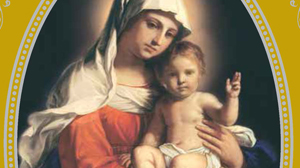Solemnity of the Blessed Virgin Mary, Mother of God
Scripture:
Numbers 6:22-27
Galatians 4:4-7
Luke 2:16-21
Reflection:
This is a feast day with several identities: the octave of Christmas, World Peace Day, the feast of the Circumcision of the Lord (Jewish tradition called for the male child to be circumcised on the 8th day after birth as a sign of membership in God’s covenant people), and, of course, New Year’s Day. Since the Second Vatican Council, the Church subsumes all of these under the beautiful tribute of this day to Mary as the Mother of God, a tradition that goes far back into Christian history. In 431 A.D., the Council of Ephesus declared Mary to be theotokos, a Greek term that literally means, the “God-bearer.”
Giving Mary this remarkable title was not primarily to praise Mary—although that is certainly part of the picture—but rather to protect the church’s tenacious belief in the genuine humanity of Jesus. Jesus, the Church affirms, is truly divine but he is also truly human—and it is that mystery of the Incarnation that enables the church to acclaim Mary of Nazareth to be truly also the “Mother of God,” because she gave birth to the God-man Jesus. Nothing is more essential to Christian faith than this belief in the identity of Jesus, as the Incarnate Word of God, truly human and truly divine. Yet in celebrating this feast on this first day of a new year, the Church proclaims that the mystery of the Incarnation also affirms something astounding about us as human beings. The Bible is convinced that all creation is sacred as a gift of God, as the opening chapter of Genesis describes. But within the kaleidoscope of beauty that is God’s creation, the human person alone is made “in the image of God.” The human person is able to love and be loved, to know and to understand—all qualities belonging to the divine.
In “becoming flesh” Jesus the Eternal Word not only became one of us but also affirms in an unimpeachable way the beauty and dignity of the human person. This conviction finds expression in the readings for today’s feast. So, the famous blessing from the Book of Numbers speaks of God’s great love for his people: “May the Lord bless you and keep you! The Lord let his face sine upon you, and be gracious to you! The Lord look upon you kindly and give you peace!” As does the Psalm response that accompanies Psalm 67: “May God bless us in his mercy.” And no emphasis on the sacredness of the human person can be stronger than Paul’s famous words in the letter to the Galatians in the second reading. “You are no longer to be called slaves but you are God’s sons and daughters”—able to address God in the intimate terms that a child uses to address his parent, “Abba, Father!”—a phrase that seems to echo Jesus’ own way of praying to his Father.
It is vital that we as Christians remember this affirmation of human dignity, indeed of human sacredness, as this New Year begins. We are not blind to human frailty and even the human capacity for terrible evil. But as Christians we also remember human goodness and the human capacity for the divine. We remember that Mary, the Mother of God, is one of us. In so many circumstances our world seems to devalue human life: wanton violence in war-torn Aleppo, gang shootings in despairing Chicago neighborhoods, innocent life cast aside before seeing the light of day or the elderly warehoused without love or attention; desperate refugees turned away or vilified by demagogues. Mary, Mother of God, do not let us forget our dignity and our responsibility as children of God.
Fr. Donald Senior, C.P. is President Emeritus and Professor of New Testament at Catholic Theological Union. He lives at the Passionist residence in the Hyde Park neighborhood of Chicago.
